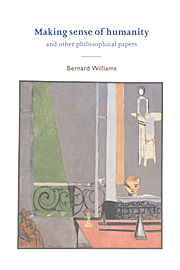Book contents
- Frontmatter
- Contents
- Preface
- I Action, freedom, responsibility
- II Philosophy, evolution, and the human sciences
- III Ethics
- 13 The point of view of the universe: Sidgwick and the ambitions of ethics
- 14 Ethics and the fabric of the world
- 15 What does intuitionism imply?
- 16 Professional morality and its dispositions
- 17 Who needs ethical knowledge?
- 18 Which slopes are slippery?
- 19 Resenting one's own existence
- 20 Must a concern for the environment be centred on human beings?
- 21 Moral luck: a postscript
- Index
20 - Must a concern for the environment be centred on human beings?
Published online by Cambridge University Press: 28 January 2010
- Frontmatter
- Contents
- Preface
- I Action, freedom, responsibility
- II Philosophy, evolution, and the human sciences
- III Ethics
- 13 The point of view of the universe: Sidgwick and the ambitions of ethics
- 14 Ethics and the fabric of the world
- 15 What does intuitionism imply?
- 16 Professional morality and its dispositions
- 17 Who needs ethical knowledge?
- 18 Which slopes are slippery?
- 19 Resenting one's own existence
- 20 Must a concern for the environment be centred on human beings?
- 21 Moral luck: a postscript
- Index
Summary
What is the role of philosophy in questions about the environment? One helpful thing that philosophy can do, obviously, is to apply its analytical resources to clarifying the issues. This is excellent, but it is an aim not exclusively cultivated by philosophy; clear analytic thought is something offered by other disciplines as well. There are more distinctively philosophical lines of thought that bear on these issues, and it is some of these that I should like to pursue. They raise, for instance, questions about the nature of the values that are at issue in environmental discussion.
Questions of this kind are likely to be more distant from practical decision than many that come up for discussion in this area. They are, in particular, difficult to fit into the political process. They can indeed run the risk of seeming frivolous or indecently abstract when questions of practical urgency are at the front of political attention. Moreover, it is not simply a matter of urgent political decisions; some of the broader philosophical considerations are not immediately shaped to any practical decision, and it is a mistake to make it seem as though they were. They are, rather, reflective or explanatory considerations, which may help us to understand our feelings on these questions, rather than telling us how to answer them.
There is no special way in which philosophical considerations join the political discussion. They join it, rather, in various of the ways in which other forms of writing or talking may do: ways that include not only marshalling arguments, but also changing people's perceptions a little, or catching their imagination.
- Type
- Chapter
- Information
- Making Sense of HumanityAnd Other Philosophical Papers 1982–1993, pp. 233 - 240Publisher: Cambridge University PressPrint publication year: 1995
- 28
- Cited by



